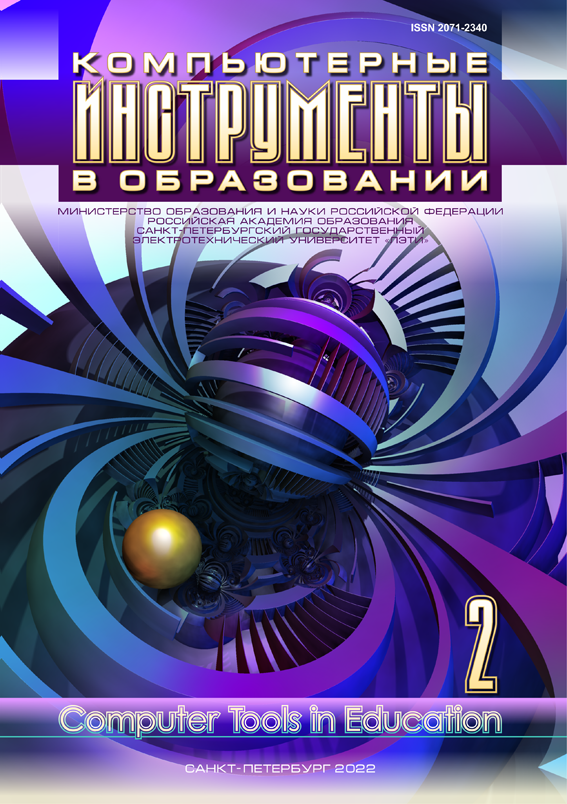A Research on the Undergraduate Student’s Engagement into the Pedagogy Specialization Training Using LearningApps Web Application
Abstract
An engagement on undergraduate students into the studying of pedagogics using the LearningApps web application is under research. Use of application’s publications in a Russian higher educational institution of pedagogics has been reviewed, including aspects and methods of research for students whose studies involve digital tools. The arguments justifying the choice of LearningApps are presented, as well as the modes of integrating the application into the pedagogical specialization. Experiment was conducted on the basis of the Vladivostok State University of Economics and Service. At the end of the semester students (n = 66) were answering a survey using a 5-point Likert scale. The results showed that the integration of LearningApps into the pedagogical specialization positively effected on student’s engagement. In the engagement profile, emotional engagement occupies the highest positions; the correlation between student’s engagement and student’s achievement has not been established. The obtained results contribute to the understanding of LearningApps as a tool for productive learning in pedagogical education sphere.
References
Антонова Д. А., Оспенникова Е. В. Методологические основы продуктивного обучения // Педагогическое Образование В России. 2020. № 6. С. 163–173.
Башмаков М. И. Теория и практика продуктивного обучения. Москва: Автономная некоммерческая организация "Издательский дом «Народное образование», 2000. 248 с.
Башмаков М. И., Горяев М. А. Развитие внеурочной деятельности методами продуктивного обучения // Человек И Образование. 2014. № 2 (39).
Герасимова Е. К. Применение онлайн-сервисов в обучении магистрантов, получающих педагогическое образование // Kant. 2019. № 2 (31).
Дудко В. В. Проектирование поддержки вовлеченности иностранных студентов в курс поточных лекционных занятий с использованием Wizer.me // Использование деятельностного подхода в проектах цифровой трансформации в образовании: учебное пособие для вузов под редакцией Л. О. Смирновой. Москва: Юрайт, 2022. С. 143–166.
Крюков В. В., Батурина О. А., Горин А. А. Методические рекомендации по проектированию и организации учебного процесса по смешанной модели электронного обучения. , 2021.
Мартюшова Е. В. Из опыта работы с платформой Learningapps.org на практических занятиях по методике обучения иностранному языку // 2019. С. 173–176.
Никитина Е. В. Применение сервиса LearningApps.org при обучении бакалавров педагогического образования. : Московский государственный областной университет, 2018. С. 71–78.
Патаракин Е. Педагогический дизайн совместной сетевой деятельности субъектов образования // 2015.
Патаракин Е. Д. Моделирование действий над объектами совместной деятельности в искусственных сообществах NetLogo и StarLogo Nova. : Общество с ограниченной ответственностью "Издательство «Экон-Информ», 2020. С. 71–78.
Патаракин Е. Д., Ярмахов Б. Б. Вычислительная педагогика: мышление, участие и рефлексия // Образовательные Технологии И Общество. 2018. Т. 21. № 4. С. 502–523.
Патаракин Е. Д., Ярмахов Б. Б. Выращивание данных для школьных виртуальных лабораторий // Вестник Российского Университета Дружбы Народов Серия Информатизация Образования. 2021. Т. 18. № 4.
Патаракин Е. Д., Ярмахов Б. Б., Буров В. В. Агентное моделирование деятельности внутри вики-систем // Образовательные Технологии И Общество. 2011. Т. 14. № 2.
Сидоров С. В. Возможности веб-сервиса Learningapps.org в преподавании вузовского курса педагогики // Сборники Конференций Ниц Социосфера. 2013. № 56–1.
Федорова Г. А. Разработка и применение электронных образовательных ресурсов в структуре методической подготовки бакалавров в педагогическом вузе // Вестник Красноярского Государственного Педагогического Университета Им В П Астафьева. 2014. № 3 (29). С. 108–112.
Arriba R. de, Vidagañ M. Sharing Drawings with Smartphones in the Classroom – Art-Based Education in Social Sciences // Int. J. Emerg. Technol. Learn. IJET. 2020. Т. 15. № 15. С. 229–236.
Bikanga Ada M. Evaluation of a Mobile Web Application for Assessment Feedback // Technol. Knowl. Learn. 2021.
Bond M. и др. Mapping research in student engagement and educational technology in higher education: a systematic evidence map // Int. J. Educ. Technol. High. Educ. 2020. Т. 17. № 1. С. 2.
Cevikbas M., Kaiser G. Student Engagement in a Flipped Secondary Mathematics Classroom // Int. J. Sci. Math. Educ. 2021.
Kandiko Howson C., Matos F. Student Surveys: Measuring the Relationship between Satisfaction and Engagement // Educ. Sci. 2021. Т. 11. № 6. С. 297.
Lee W., Reeve J. Teachers’ estimates of their students’ motivation and engagement: being in synch with students // Educ. Psychol. 2012. Т. 32. № 6. С. 727–747.
Mshayisa V. V. Students’ perceptions of Plickers and crossword puzzles in undergraduate studies // J. Food Sci. Educ. 2020. Т. 19. № 2. С. 49–58.
Ortega F. da C., Irala V. B. Mensuração do engajamento online de estudantes do ensino superior: uma revisão de escopo na literatura internacional // Texto Livre. 2022. Т. 15. С. e35747–e35747.
Pettit R. K. и др. Student perceptions of gamified audience response system interactions in large group lectures and via lecture capture technology // Bmc Med. Educ. 2015. Т. 15. С. 92.
Saracostti M. и др. Online Platform for the Evaluation of School Engagement, 2.0 Version: From the Chilean Experience to its Use in Iberoamerican Countries // Rev. Iberoam. Diagn. Evaluacion-E Avaliacao Psicol. 2021. Т. 2. № 59. С. 137–149.
Schwartz D. L. The productive agency that drives collaborative learning // In P. Dillenbourg (Ed.), Collaborative learning: Cognitive and computational approaches. , 1999.
Terrion J. L., Aceti V. Perceptions of the effects of clicker technology on student learning and engagement: a study of freshmen Chemistry students // Res. Learn. Technol. 2012. Т. 20. № 2. С. 16150.
Tight M. Student retention and engagement in higher education // J. Furth. High. Educ. 2020. Т. 44. № 5. С. 689–704.
Zepke N. Student engagement in neo-liberal times: what is missing? // High. Educ. Res. Dev. 2018. Т. 37. № 2. С. 433–446.

This work is licensed under a Creative Commons Attribution 4.0 International License.







